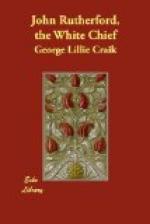are cannibals upon principle and system. Mr. Marsden,[J]
in his “History of Sumatra,” seems to confine
their cannibalism to the accustomed cases of prisoners
taken in war and to other gratifications of revenge.
But it is stated by Sir Stamford Raffles, upon testimony
which is unimpeachable, that criminals and prisoners
are not only eaten according to the law of the land,
but that the same law permits their being mangled
and eaten while alive. The following extraordinary
account, which we extract from a letter of Sir Stamford
Raffles to Mr. Marsden himself, dated February 27,
1820, is sufficiently revolting; but it is important
as showing the wonderful influence of ancient customs
in hardening the hearts of an otherwise mild and respectable
people, and is therefore calculated to make us look
with less severity upon the practices of the more
ignorant New Zealanders. The progress of knowledge
and of true religion can alone eradicate such fearful
relics of a tremendous superstition—the
offering, in another shape, to
Moloch, horrid king, besmear’d with
blood
Of human sacrifice.
I have found all you say on the subject of cannibalism more than confirmed. I do not think you have even gone far enough. You might have broadly stated, that it is the practice, not only to eat the victim, but to eat him alive. I shall pass over the particulars of all previous information which I have received, and endeavour to give you, in a few words, the result of a deliberate inquiry from the Batta chiefs of Tappanooly. I caused the most intelligent to be assembled; and in the presence of Mr. Prince and Dr. Jack, obtained the following information, of the truth of which none of us have the least doubt. It is the universal and standing law of the Battas, that death by eating shall be inflicted in the following cases:—Adultery; midnight robbery; wars of importance, that is to say, one district against another, the prisoners are sacrificed; intermarrying in the same tribe, which is forbidden from the circumstance of their having ancestors in common; treacherous attacks on a house, village, or person. In all the above cases it is lawful for the victims to be eaten, and they are eaten alive, that is to say, they are not previously put to death. The victim is tied to a stake, with his arms extended, the party collect in a circle around him, and the chief gives the order to commence eating. The chief enemy, when it is a prisoner, or the chief party injured in other cases, has the first selection; and after he has cut off his slice, others cut off pieces according to their taste and fancy, until all the flesh is devoured. It is either eaten raw or grilled, and generally dipped in sambul (a preparation of Chili pepper and salt), which is always in readiness. Rajah Bandaharra, a Batta, and one of the chiefs of Tappanooly, asserted that he was present at a festival of this kind about eight years ago, at the village of Subluan, on the other side of the bay, not nine miles




